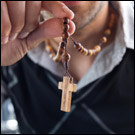By Jeremy ReynaldsSenior Correspondent for ASSIST News Service
EGYPT (ANS) -- Copts in the North Sinai border town of Rafah have started leaving their homes after receiving an ultimatum from Islamists to leave "within 48 hours" or be killed.
According to a story by Mary Abdelmassih for the Assyrian International News Agency (AINA), confirmed reports say nine Coptic families have left the town. The remaining 23 Coptic families are still there, waiting to leave.
AINA reported that one Copt who is still with his family in Rafah said, "It is difficult for us to leave as most of us are shop owners and have property, so it is not easy just to leave everything and go."
The Copts are all confined to their homes, afraid to venture out.
AINA said however, two days ago masked men on motorcycles sprayed Coptic stores with bullets, but no one was hurt.
AINA reported that the nine Coptic families who left Rafah were government employees and the Governor of North Sinai offered to transfer them to neighboring Sinai Province capital, Al-Arish, to take posts there instead.
About three weeks ago a Coptic shop owner received a hand-written threat that "all Christians should leave Rafah within 48 hours, otherwise they will be killed."
AINA said Copts reported these threats to security but were told not to take the threats "earnestly," because threats were during the time of the YouTube video clip mocking Mohammad.
"We thought the writers of these threats were just being vindictive against the Copts since it was claimed that a US Copt is responsible for it (the film)," said a Copts resident of Rafah.
AINA said Coptic families went with church representatives and met with the Governor of North Sinai asking for protection. He promised none, but just transferred nine government employees to work in Al-Arish.
AINA said the Coptic Church issued a statement, after a meeting of the Holy Synod, signed by acting Patriarch Anba Pachomios. It condemned the forced displacement of the Copts from Rafah, demanding that the "responsible state agencies address those that are trying to undermine the state authority and show it unable to protect its citizens."
According to AINA the statement further said, "Nearly one month ago the media had published the violations against the Copts but the Egyptian authorities have not taken the necessary measures to protect the Egyptian families, who have the right to live safely in their homes."
It went on say that the series of Coptic displacement started with El-Ameriya, then Dahshour, and has now reached Rafah.
AINA said political parties and human rights organizations were angered by the forced displacement of the Rafah Copts. Many believe that this is the "method Islamists are using to change Egypt demographically. Since they want an Islamic state in Sinai, all Copts have to go out," said Coptic activist Mark Ebeid.
Dr. A. Shokr, vice-president of the National Council for Human Rights, said that they will support the displaced families as well as send a fact-finding mission next week to Rafah.
AINA said the Muslim Brotherhood Party "Freedom and Justice" published an article saying that following an interview with H.G. Cosman, Bishop of North Sinai, no Copts were displaced.
However, AINA said, Bishop Cosman denied giving an interview to a Muslim paper and confirmed that some Coptic families have left Rafah and live in Al-Arish. He added that some, fearing for their lives, are transferring their furniture and belongings from Rafah to Al-Arish because of the deteriorating security conditions.
AINA said that novelist and Sinai activist Mosad Abu Fagr commented to ElYom7 daily that what is happening in Sinai now indicates that President Morsi was defeated in his war in Sinai. In addition, his adversaries already control the area, and because Christians are the weakest link in Rafah, it started with them.
He added that the rest will be displaced and the Islamists will take control of the areas of Rafah, Sheikh Zuwaid, Arish and Bir al-Abed. All of Sinai will be lost and become under the control of the Islamists.





